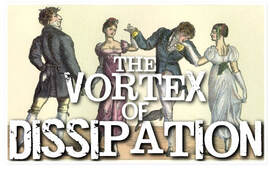| "If a poor devil is once in a vortex, he must whirl on." -- Edward Grenville, spendthrift man about town, in Private Life: or Varieties of Character and Opinion (1829) |

My guest blog is based on a bit of advice that Jane Austen sent to her niece Anna Austen LeFroy concerning novel-writing.
Austen didn't care for the phrase "vortex of dissipation." She thought it was what we would call today a cliché. And a lot of authors used the term, as well as a lot of essayists! I supply just a sample in my blog post. Many 18th century novels showed dissipated characters, but for the purposes of morality, it was important that they either be reformed or be punished by the end of the story. Thus they provided both titillation and a moral lesson. It seems to me that many novels portrayed the London social scene is venal and populated with frivolous, malicious, stupid people. Routs and masked balls were crowded, insufferably hot (think of all those bodies in motion and all those candles) and a minefield of social danger, yet some of the characters would go to any lengths to be called a member of the ton and stay a member of the ton. Regency FOMO, if you will.
I think my favourite dissipated character in 18th century literature is Lady Delacour from Belinda by Maria Edgeworth, though she doesn't use the word "vortex." She's witty and clever. In this quote, she's teasing Belinda for acting like a good 18th century girl and being oblivious to the fact that a man likes her: “If you would only open your eyes, which heroines make it a principle never to do—or else there would be the end of the novel—if you would only open your eyes, you would see that this man is in love with you; and whilst you are afraid of his contempt, he is a hundred times more afraid of yours; and as long as you are each of you in such fear of you know not what, you must excuse me if I indulge myself in a little wholesome raillery.”
Delacour's also a spendthrift and, until she's reformed later in the novel, morally bankrupt as well. However, she's a much more energetic and interesting character than the heroine Belinda, as these18th century scholars discuss near the end of this podcast about female authors.
I've got more about the Vortex of Dissipation at this earlier post.
 RSS Feed
RSS Feed